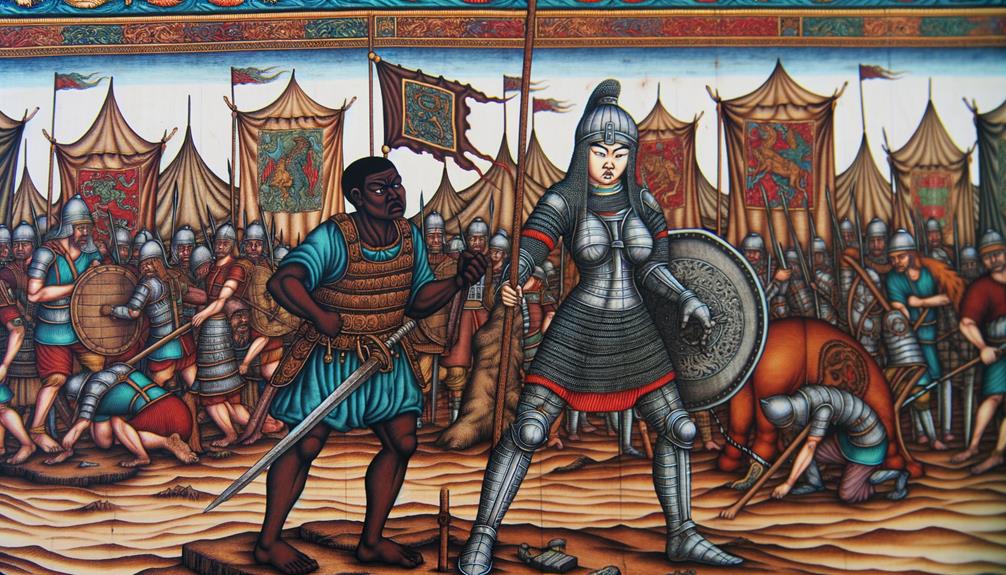Armor Bearer Meaning in the Bible: Loyalty and Service
In the Bible, an armor bearer served as a trusted aide to a warrior, responsible for carrying weapons and providing protection, exemplified by individuals like Jonathan’s companion in 1 Samuel 14:6-7. This role demanded loyalty, bravery, and immediate execution of commands, often sharing in the leader’s dangers and honors.
Armor bearers symbolize servanthood and faithful support, reflecting biblical themes of humility and dedication akin to Christ’s example in Matthew 20:28. Their unwavering commitment and essential support highlight critical virtues in biblical leadership, offering profound insights into theological and spiritual dynamics within the sacred narrative.
Discover further depth in their significance.

Armor Bearer in the Bible: Meaning, Role, and Spiritual Significance
| Aspect | Details |
|---|---|
| Definition | An armor bearer was a trusted aide who carried the weapons and shield of a warrior or leader, offering support in battle. |
| Biblical References | Mentioned in 1 Samuel 14:7 and 1 Samuel 31:4, with roles depicted in stories of Jonathan and King Saul. |
| Responsibilities | Included carrying weapons, protecting the leader, and offering encouragement and unwavering loyalty. |
| Symbolism | Represents faithfulness, service, and the strength found in supporting others’ missions or leadership. |
| Spiritual Significance | Highlights the importance of servanthood, trust, and unity in achieving victory and fulfilling God’s purposes. |
| Modern Relevance | Serves as a model for spiritual support, emphasizing the value of loyalty and assisting others in their calling. |
Historical Context

In the historical context of the Bible, an armor bearer served as a personal aide and trusted companion to a warrior, often facilitating both logistical and combat support. This role is exemplified in passages such as 1 Samuel 14:6-7, where Jonathan and his armor bearer undertake a courageous assault against the Philistines.
The armor bearer was not merely a servant but held a position of significant trust and responsibility, often sharing in the dangers and honors of battle. Their presence underscores the importance of loyalty and valor in biblical narratives, shedding light on the hierarchical and militaristic structures of ancient Israelite society.
Scripturally, armor bearers symbolize unwavering support and dedication, essential for understanding the dynamics of biblical warfare and leadership.
Role and Duties

The role and duties of an armor bearer in biblical times extended beyond mere logistical support to encompass critical responsibilities in the heat of battle, as demonstrated in various scriptural accounts. Their tasks included:
- Carrying Weapons: Ensuring the leader had immediate access to necessary arms.
- Providing Protection: Shielding their master from enemy attacks and potential threats.
- Offering Encouragement: Strengthening their leader’s resolve through moral support and loyalty.
- Executing Commands: Swiftly and accurately acting on the leader’s directives, even in perilous situations.
These duties required unwavering dedication, physical strength, and profound trustworthiness.
The armor bearer’s role was indispensable, reflecting a deep commitment to both the leader and the broader mission they were engaged in. This underscores their integral position within biblical narratives.
Biblical References

Scriptural accounts of armor bearers, such as those found in 1 Samuel 14:6-7 and 1 Samuel 31:4, illuminate the profound trust and essential support they provided to their leaders during critical moments in biblical history. These narratives underscore the indispensable role armor bearers played, acting as confidants and protectors in the heat of battle.
| Scriptural Reference | Key Figure | Role of Armor Bearer |
|---|---|---|
| 1 Samuel 14:6-7 | Jonathan | Encourages and supports Jonathan’s bravery |
| 1 Samuel 31:4 | Saul | Aids Saul in his final moments |
| Judges 9:54 | Abimelech | Ends Abimelech’s suffering |
| 1 Samuel 16:21 | David | Serves Saul, provides musical comfort |
These references reflect the armor bearer’s critical role in biblical narratives.
Famous Armor Bearers

Examining the role of famous armor bearers in the Bible, Jonathan’s unnamed armor bearer exemplifies unwavering support and bravery in 1 Samuel 14:6-14, illustrating the essential partnership in achieving divine victories.
Similarly, the loyalty of Saul’s armor bearer is poignantly depicted in 1 Samuel 31:4-5, where his refusal to outlive his master underscores the profound bond and duty inherent in this role.
These narratives provide profound theological insights into the virtues of loyalty, courage, and faithfulness within the biblical tradition.
Jonathan and His Armor Bearer
Jonathan’s unwavering faith and the loyalty of his armor bearer are prominently highlighted in 1 Samuel 14, offering profound insights into the dynamics of biblical companionship and divine intervention. This narrative exemplifies several key theological themes:
- Faith in Divine Providence: Jonathan trusts that ‘nothing can hinder the Lord from saving, whether by many or by few’ (1 Samuel 14:6).
- Courage and Initiative: Jonathan and his armor bearer take proactive steps, believing in God’s support.
- Loyalty and Obedience: The armor bearer’s response, ‘Do all that you have in mind… I am with you heart and soul’ (1 Samuel 14:7), epitomizes loyalty.
- Divine Confirmation: Their success is seen as a demonstration of God’s intervention, affirming their faith and actions.
This episode underscores the profound synergy between human initiative and divine will.
Saul’s Armor Bearer Loyalty
In the tragic conclusion of Saul’s reign, the loyalty of his armor bearer is poignantly illustrated in 1 Samuel 31:4-5, where he refuses to outlive his king and chooses to die alongside him.
This act of unwavering fidelity underscores the profound bond between a king and his armor bearer. Saul’s armor bearer, faced with the imminent defeat by the Philistines, mirrors the desperation and loyalty of his sovereign, encapsulating the ethos of servanthood and allegiance.
His decision to fall upon his own sword after Saul’s death demonstrates the gravity of his commitment and the weight of his role.
This narrative invites readers to reflect on the theological implications of loyalty, duty, and sacrificial service in biblical contexts.
Symbolism and Themes

Central to the role of an armor bearer in the Bible is the profound symbolism of service, loyalty, and spiritual support, reflecting broader theological themes of discipleship and divine allegiance. This symbolism is not only evident in the relationships between warriors and their armor bearers but also resonates with the broader notion of community and collective strength in faith.
Additionally, the concept of apothecary symbolism in biblical texts highlights the importance of preparation and care, akin to how an armor bearer must be diligent in ensuring their leader is equipped for the challenges ahead.
Ultimately, these roles exemplify the essence of mutual support and dedication found throughout scripture, encouraging believers to uplift one another in their spiritual journeys.
Scripturally, this role embodies essential principles:
- Service: An armor bearer epitomizes servanthood, akin to Christ’s call in Matthew 20:28 to serve rather than be served.
- Loyalty: The unwavering dedication to their leader mirrors the fidelity expected of believers to God.
- Protection: They provide physical and spiritual safeguarding, symbolizing God’s protective nature (Psalm 121:7).
- Support: Their readiness to assist parallels the Holy Spirit’s role as a helper (John 14:26).
These themes underscore the integral support and commitment inherent in Christian discipleship and divine fellowship.
Lessons in Leadership

The role of the armor bearer in biblical narratives exemplifies integral facets of leadership, such as the servant leadership model, humility in service, and the importance of trust and loyalty.
Reflecting on 1 Samuel 16:21, where David served as Saul’s armor bearer, we observe a profound demonstration of these principles.
This relationship underscores how true leadership is rooted in serving others with humility and unwavering loyalty, providing a timeless blueprint for effective leadership today.
Servant Leadership Model
Although often overlooked, the role of the armor bearer exemplifies the profound biblical principle of servant leadership, as evidenced in the narratives of Jonathan and his armor bearer in 1 Samuel 14. This relationship reflects key aspects of servant leadership:
- Loyalty and Support: The armor bearer unwaveringly supports his leader, embodying unwavering commitment (1 Samuel 14:7).
- Courage and Initiative: He participates actively in Jonathan’s bold plan, showcasing courage and proactive engagement (1 Samuel 14:12-14).
- Shared Victory: The armor bearer’s actions contribute considerably to the battle’s success, highlighting collective achievement (1 Samuel 14:23).
- Faith and Obedience: His faith in Jonathan’s vision mirrors trust in divine direction, emphasizing spiritual discernment (1 Samuel 14:6).
These elements underscore a leadership model rooted in service, dedication, and faith.
Humility in Service
Drawing from the example of the armor bearer, true leadership in the biblical context necessitates a profound sense of humility and selflessness, as illustrated in Philippians 2:3-4.
The armor bearer’s role was not one of glory but of essential support, reflecting Christ’s call to esteem others above oneself.
Philippians describes this humility: ‘Do nothing out of selfish ambition or vain conceit. Rather, in humility value others above yourselves, not looking to your own interests but each of you to the interests of the others.’
This scriptural mandate underscores the importance of humility in service, where genuine leadership is characterized by prioritizing the welfare of others, consequently embodying the servant-hearted nature of Christ.
Such humility is foundational for effective, godly leadership.
Trust and Loyalty
Trust and loyalty are indispensable virtues in biblical leadership, as exemplified by the armor bearer’s unwavering dedication to their leader. The relationship highlights several key lessons:
- Commitment to the Leader: The armor bearer’s role required absolute trust, akin to Jonathan’s armor bearer in 1 Samuel 14:7, who vowed to follow his leader wholeheartedly.
- Reliability: An armor bearer had to be dependable, ensuring the leader could focus on strategy, as seen in Saul’s reliance on his armor bearer in 1 Samuel 31:4.
- Confidentiality: Trustworthiness meant safeguarding sensitive information, reflecting the biblical principle of discretion.
- Support in Adversity: Loyalty was vital during battles, symbolizing unwavering support, much like David’s faithful men in 2 Samuel 23:9-10.
These principles underscore the profound biblical ethos of trust and loyalty in leadership.
Modern Interpretations

In contemporary Christian circles, the role of an armor bearer is often reinterpreted to signify a personal assistant or spiritual support to church leaders, drawing parallels to the biblical narrative while adapting to modern ecclesiastical needs.
This reinterpretation finds its roots in passages like 1 Samuel 14:6-7, where Jonathan’s armor bearer displays unwavering support. Today, armor bearers assist with logistical tasks, provide emotional and spiritual encouragement, and uphold the leader’s vision.
| Biblical Role | Modern Interpretation |
|---|---|
| Physical Protection | Emotional and Spiritual Support |
| Carrying Weapons | Managing Logistical Tasks |
| Unwavering Loyalty | Upholding Leader’s Vision |
| Battlefield Presence | Church or Ministry Context |
| Direct Obedience | Collaborative Assistance |
This evolution reflects the dynamic nature of ministry roles within contemporary Christian practice.
Spiritual Significance

The spiritual significance of the armor bearer in biblical texts lies in their embodiment of faithfulness, service, and trust, as exemplified in passages such as 1 Samuel 16:21, where David serves Saul. This role carries profound theological implications, highlighting key virtues essential to spiritual leadership and discipleship.
Faithfulness: Armor bearers display unwavering loyalty, as seen in their commitment to protect and support their leaders (1 Samuel 14:6-7).
Service: Their role underscores the importance of selfless service, reflecting Christ’s call to serve others (Philippians 2:5-7).
Trust: They epitomize the deep trust placed in them, paralleling the trust believers place in God (Proverbs 3:5-6).
Support: Armor bearers provide essential support, symbolizing the mutual support within the body of Christ (1 Corinthians 12:12-27).
Conclusion
The role of the armor bearer, as seen in biblical texts, provides profound insights into leadership, loyalty, and servitude.
For instance, Jonathan’s armor bearer demonstrated unwavering support and courage in 1 Samuel 14:6-14, embodying the virtues of faith and dedication.
Historically and symbolically rich, the armor bearer’s duties extend beyond mere physical protection, reflecting deeper spiritual themes.
Contemporary interpretations continue to draw from these ancient lessons, offering valuable perspectives for modern spiritual and leadership contexts.






